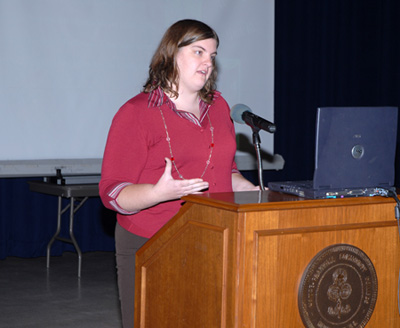VGCC Seminar discusses epidemics in literature

The global outbreak of H1N1 influenza is a hot topic in 2009, but English instructors at Vance-Granville Community College recently demonstrated that epidemic disease has been a topic of interest to writers for centuries. Instructors James Powell, Dr. Tanya Olson and Maureen Walters talked about the intersection of epidemics and literature in the VGCC Civic Center on Nov. 18. Their seminar was the final installment in a three-part series on epidemics organized by the college’s Arts and Sciences instructors. The earlier seminars focused on how environmental factors shape the spread of disease, and on the importance of epidemic disease in the history of the South.
James Powell started the seminar by noting that when he first thought of literature about epidemics, he thought of the Bubonic Plague, or “Black Death,” which killed millions, particularly in the 14th century, and inspired numerous authors. Chief among them was the Italian writer Boccaccio, whose Decameron includes his vivid first-hand observations of the plague. Powell said that writing about epidemics did not start with Boccaccio, however. From Thucydides in ancient Greece through Stephen King and others today, authors throughout history have written about real and imaginary plagues. “A few themes come up again and again, such as fleeing the devastation of the plague and disposing of massive numbers of corpses,” Powell said. “In the 1700s, Daniel Defoe wrote about quacks making money off the plague ravaging England, and quacks are still with us today.”In her remarks, Dr. Tanya Olson turned the conversation to an entirely fictitious form of disease: Vampirism. Stories of vampires have been around for centuries but became a popular subject of literature in the 1800s, with the most famous example being Bram Stoker’s Dracula. Olson noted that vampirism spreads from person to person like a disease in these stories, and was used to speak metaphorically about political and social concerns. Maureen Walters brought the discussion of vampires into contemporary literature, including the popular Twilight series. “Vampires are different in modern literature,” Walters said. “They’re not necessarily evil. They’re often tragic heroes.” She said that modern worries about epidemic disease may be one reason that vampire literature is appealing. “These books allow us to explore our fears without admitting that we’re afraid, so they are here to stay,” Walters said.
Above: VGCC English instructor Maureen Walters concludes a seminar on epidemics in literature on Nov. 18 in the Civic Center on the college’s main campus. (VGCC photo)

